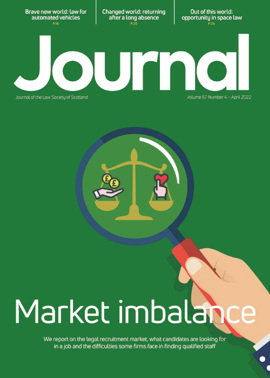Opinion: Ruth Croman
Rob Aberdein’s predictions for the demise of the high street firm, in a recent newspaper article, raised a few eyebrows round our partnership table. A bleak future was painted for the traditional partnership, the hallmark of the high street firm – with a blame culture, slow decision-making and protectionism of clients particularly highlighted as problem factors. And yet, as a high street practitioner for all my legal career, I don’t share his pessimism.
There will undoubtedly be, as in all business sectors across the country, traditional legal partnerships which operate in broadly the same way as they have for 30 years, with strict hierarchical structures, perception of clients as “belonging” to an individual, and an expectation that being a lawyer, in and of itself, is more than adequate training to run a business. They may well be resistant to change, and indeed slow to recognise changing attitudes and business practices.
Mr Aberdein’s article seems to me, however, to castigate businesses (and individual partners) unwilling or unable to move with the times and recognise a changing landscape, rather than highlight anything inherently wrong with the traditional partnership model itself.
His observations appear to assume a poor business culture, with jostling for “ownership” of clients, and individual egos getting in the way of doing what is best. What is best both for a forward thinking legal firm, and its people, is much more than the collective of individuals working there. A poor business culture is far from the preserve of the traditional high street partnership.
He seems to discount completely the value of personal relationships to clients. Undoubtedly clients are more mobile than historically, but is that not a good thing for our businesses? Firms that are not available and approachable will suffer. Businesses that offer truly client-focused service can benefit from the ability and inclination to shop around. The arrogant supposition of “ownership” of a client speaks volumes of a poor culture, focused on what the client can bring to the business rather than what service the business can offer the client.
Technology has massively changed how we all do our jobs, and will continue to do so. The capabilities of AI in legal tech are quite astounding. But an algorithm or slick software is no substitute for talking someone through their options when they have been floored by a separation, or devastated by a close family member’s death. Technology will be essential going forward, but the key for practitioners and business leaders will be knowing when the interaction with the client should be personal, and when it should be digital. It needs to complement the personal relationship between solicitor and client and form part of, not the entirety of, the client journey.
Undoubtedly some clients might prefer the “one stop shop” that Mr Aberdein envisions, but not all will. Different legal businesses cater for different clients, and always have done. Our high street firm will never rank on the Dealmaker List, but that doesn’t mean it can’t operate as a successful and innovative business. The advent of alternative business structures is something, in my view, to be welcomed. I don’t agree with the assertion that only with the introduction of non-lawyer business partners will fresh thinking and opportunity be achieved – that flies in the face of my experience of so many innovative and creative young lawyers, whose knowledge and technological abilities stretch far beyond the black letter.
Smaller firms are inherently more agile, and therefore able to adapt quickly to both market challenges and opportunities. Slowed down decision making? Au contraire – no need for multiple committees and business plans before opportunities are seized.
The partnership model is not dead, or even dying. Choose carefully who you enter partnership with (and indeed who you work with more broadly), and make sure your values align. Entering into partnership with someone whose sole focus is on what is in it for them, shouldn’t lead to shock when you encounter a “siloing” attitude. The litmus test? Make sure you would be happy to refer a friend to them for a piece of work.
Respect a client’s right to choose who they instruct, and ask your clients regularly how the firm measures up. Why should choosing a lawyer be any different from choosing to shop in Waitrose or Aldi? Different firms have different offerings, and strengths and variety are key.
Yes, the working landscape has changed. Yes, the attitudes of younger members of the profession have changed and are changing, but all this is just part of the evolution of how we practise law. As with any business, standing still equates to moving backwards. Listen to your clients, listen to your team members, and find a practice (quite possibly through trial and error) that resonates with you. Well run high street practice partnerships, who are happy to adapt and respond, and where client experience is key, are out there, and will still be here in 2032.
Perspectives
Features
Briefings
- Criminal court: Thom bar still applies
- Licensing: tighter rules for the pet trade
- Insolvency: Transition from the COVID measures
- Tax: What did the Spring Statement bring?
- Immigration: Providing a home for Ukrainians
- Scottish Solicitors' Discipline Tribunal
- Property: RCI – what does it involve?
- In-house: Looking for a star







